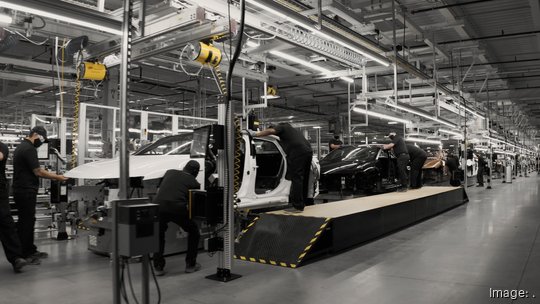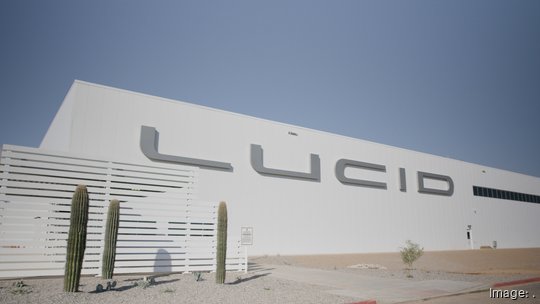
When it comes to manufacturing growth in recent years, Arizona beats out nearly every state in the country, with a significant portion of these jobs coming in the battery and electrical vehicle (EV) industry. Even more noteworthy is the fact that a majority of these expansions have taken place in rural communities.
In 2016, Lucid Motors made history when it announced Casa Grande as the site of its new, 1-million-square-foot EV manufacturing facility.
“We started with over 60 potential factory sites in 13 states scattered across the United States,” said Brian Barron, then director of global manufacturing at Lucid Motors. “We chose Arizona because you showed genuine interest in our company from the outset, because you negotiated in fairness and understanding, and because you continue working together with us from a partnership perspective and not just a business perspective.”
Lucid’s AMP-1 factory began construction in December 2019 and was operational within 12 months. A few years later, Motor Trend Magazine named Lucid Air its 2022 Car of the Year.
Lucid’s success has sparked a growing network of electric vehicle manufacturers, parts makers, and battery innovators. Five EV manufacturers have established operations in Arizona since 2016. In just the past two years, the state has attracted nearly a dozen battery expansions, including manufacturers, recyclers, and mineral processing facilities. Roughly half of these expansions have occurred in rural Arizona.
“Arizona’s rural communities offer companies and employees an incredible quality of life combined with easy access to transportation corridors and top-of-the-line training institutions,” said Sandra Watson, president and CEO of the Arizona Commerce Authority (ACA).
In 2021, Midwestern-based auto parts maker UACJ Whitehall selected Flagstaff for its $60 million factory, citing Northern Arizona’s proximity to university talent and nearby manufacturing partners. The announcement from the Lucid supplier represented the largest economic development win in Flagstaff in nearly half a century.
“UACJ Whitehall’s expansion into Flagstaff is a game-changer for our local economy,” said Julie Pastrick, president and CEO of the Greater Flagstaff Chamber of Commerce. “The company’s investment here locally will eventually grow into hundreds of high-wage jobs and further establishes Arizona as a leader in EV innovation.”
It seems every corner of Arizona has attracted jobs in the EV/battery industry.
For EVelution Energy, a small town outside Yuma, Arizona, represented the ideal location for its solar-powered, cobalt-processing facility for electric vehicle batteries. Once operational, the facility will be the only cobalt processing facility in North America.
Gil Michel-Garcia, EVelution’s co-founder, cited Yuma’s “lower cost of living” and "lower regulatory jurisdiction" as well as its proximity to California’s EV market in choosing southwestern Arizona.
Additional battery innovators have set up in Casa Grande, Eloy, Coolidge, Queen Creek, and Buckeye, in addition to larger cities including Tucson and Gilbert.
Last year, LG Energy Solution’s decision to build a state-of-the-art battery manufacturing complex in Queen Creek represented one of the largest foreign direct investments in the country. Once complete, the complex, which will support thousands of new jobs, will represent the largest single investment for a stand-alone battery manufacturing facility in North America.

A key enabling factor for rural Arizona’s manufacturing attractiveness lies in strategic training partnerships. A new initiative led by the Arizona Commerce Authority, in partnership with local community colleges, has brought unique training facilities to places such as Coolidge, Yuma, and Kingman.
The network, known as Future48 Workforce Accelerators, offers customized training pathways, designed in collaboration with industry partners and hosted at local community colleges.
The program builds off the model of Drive48, a partnership between the ACA, Central Arizona College, the city of Casa Grande, Pinal County, and Lucid.
“Casa Grande has seen nothing like this. Pinal County has seen nothing like this,” said Vicente Procela, one of the more than 2,400 students to graduate from the Drive48 program since 2021.
Since 2011, the ACA has worked with local partners to land more than 166 expansion projects in rural communities, representing over 25,000 jobs and more than $13 billion in capital investment.
Flagstaff business advocate Julie Pastrick credited wins like Lucid with helping rural communities diversify and be “a larger part of the new statewide economy.”
“The Arizona Commerce Authority and other economic partners have worked hard to keep that economic momentum going for cities and towns of all sizes,” she said.
Find out more about the advantages of Arizona’s rural communities at www.azcommerce.com/programs/rural-destinations/.